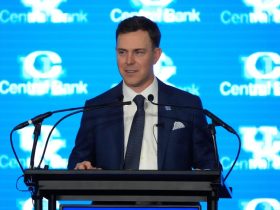What Betty Shiffrin thought of her granddaughter’s triumph at the Sochi Games will forever be a mystery, though, one of so many memories stolen because of Alzheimer’s.
“It’s bittersweet,” Shiffrin told USA TODAY Sports. “As much as that was one of her last memories made … I don’t know what she knew and I don’t know how proud she was, and I wish … I don’t know.
“I guess it’s this wonderful thing to think she got to see it,” Shiffrin said. “And then it’s also the sadness of wishing I knew more and understood more and could have somehow carried her burden.”
She might not have been able to do that for her grandmother. But she can for other families. In honor of her grandmother, Shiffrin is partnering with Lilly USA to raise awareness about Alzheimer’s and Kisunla, a treatment for people in the early stages of the disease.
Nearly 7 million Americans have Alzheimer’s disease, a progressive brain disorder that affects memory, cognitive ability and language skills. Betty Shiffrin had Alzheimer’s for several years before she died in October 2014, eight months after Sochi. She was 86.
Shiffrin isn’t sure exactly when Betty Shiffrin began showing signs of Alzheimer’s, nor was she certain as a young teenager what was causing the changes in her grandmother. But she knew her grandmother’s personality, all the things that made her grandmother her grandmother, were disappearing.
“I was basically losing access to somebody who had been so instrumental in my family,” Shiffrin said.
Grandmother laid groundwork for Shiffrin’s skiing career
Betty Shiffrin and her husband loved to ski, and they had a place in Vermont where they’d take their kids skiing. Jeff Shiffrin passed that passion along to his children, Mikaela and her older brother, Taylor.
“I don’t think it’s possible that I didn’t become a ski racer (with) the way that my grandma saw the sport and had such a passion for skiing,” said Shiffrin, who is the all-time leader in World Cup victories and can add to her total with Saturday’s slalom race in Levi, Finland.
“She was very much the mindset of, ‘You don’t stop skiing because you get old. You get old because you stop skiing.’ That’s a T-shirt that somebody in my family had.”
Shiffrin’s father was a doctor, so he knew exactly what was happening to his mother. And what was in store for the entire family as her decline progressed.
Alzheimer’s is believed to be caused by a buildup of amyloid plaques, which cause brain cells to die. The disease often presents initially as forgetfulness but, as it progresses, can cause the loss of both short- and long-term memory. People with Alzheimer’s can lose the ability to perform routine tasks, recognize loved ones or speak, and the disease can also cause mood swings, depression and personality changes.
An incurable disease, Alzheimer’s leaves a lasting toll
There is no cure for Alzheimer’s. The cost of care can be exhaustive, both emotionally and financially.
“My dad being a doctor had access to this wealth of knowledge. But, at the end of the day, there was also a feeling like maybe out of his control and the sadness, the frustration that came along with that and just how Alzheimer’s does deeply impact the families,” Shiffrin said.
“My dad and my aunt were getting the brunt of those challenging conversations with somebody you love, to explain to them why this has to be the way it is, and she wasn’t understanding it,” Shiffrin said. “And as time went on, you could see that cognitive decline. So it was challenging to see that personally.”
Making it even more gut-wrenching is, until the last few years, there was very little that could be done for people with Alzheimer’s. Almost 20 years passed without new treatments being approved.
Kisunla, Lilly’s drug, slows the progression of Alzheimer’s by attacking amyloid plaques and removing them from the brain. While it’s not a cure and it does not reverse memory loss, Lilly said the infusion reduced the rate of decline by up to 35% during trials.
“The most important thing is that families do understand that there are treatment options,” Shiffrin said. “People really need to discuss with their doctors and see if that’s a proper option for them.
“Hopefully spreading the word on that is going to, ideally, help a lot of families be able to enjoy a little bit more time with their loved ones.”
Families like her own.






